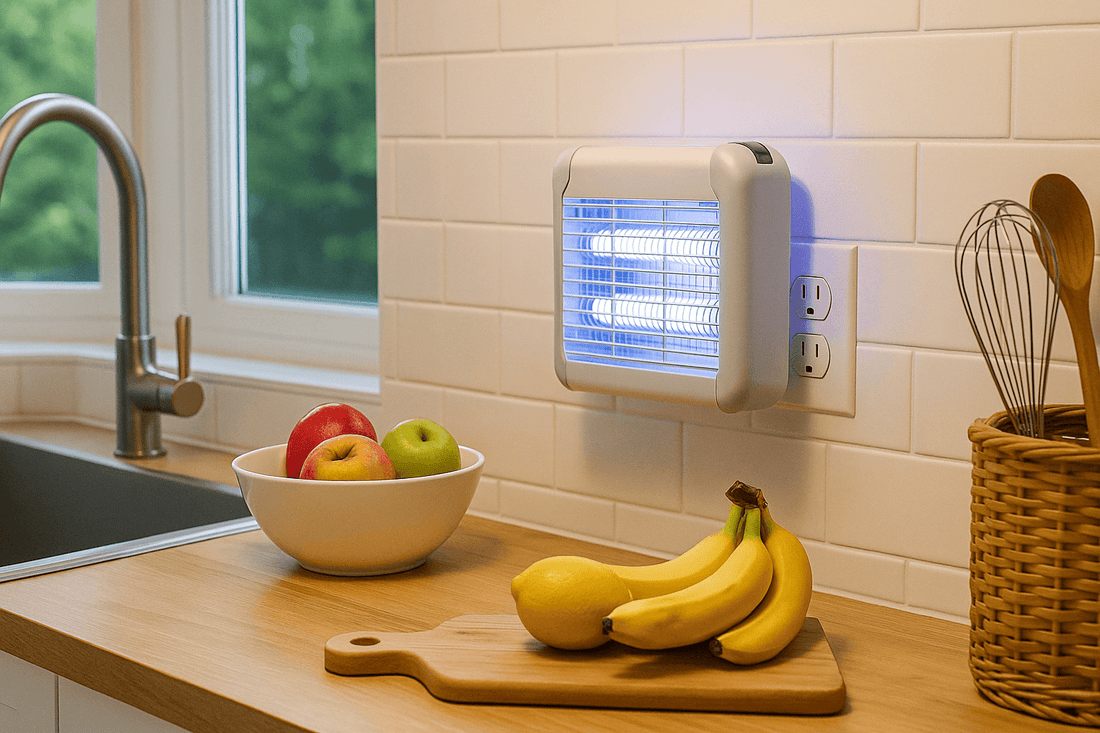Flies in the kitchen or dining room are more than just annoying—they can carry bacteria and contaminate food. Whether you’re preparing meals in your Houston apartment or enjoying dinner in a cozy Vermont farmhouse, keeping your food spaces free from flying pests is essential. In this guide, we’ll walk you through how to use an indoor fly killer for kitchen use, how to position it properly, and how to choose the safest and most effective product for your home. Let’s make your kitchen a fly-free zone without the guesswork.
Why Flies Are a Problem in the Kitchen
The kitchen is a magnet for flies—especially if you leave fruits out, have food scraps in the trash, or deal with moisture from the sink. Fruit flies and house flies are common culprits, and they can multiply quickly. A kitchen fly trap helps break the breeding cycle by attracting and eliminating these pests before they become a full-blown infestation.
Choosing the Right Indoor Fly Killer
Look for a non-toxic fly killer for food area that’s safe around food, kids, and pets. Some top-rated options use UV light to attract flies and a sticky glue board to trap them—no chemicals, no smell. If you have an open-concept kitchen like many homes in Phoenix, AZ, a plug-in indoor bug zapper for kitchen can blend in with the décor while working quietly in the background.

How to Place an Indoor Fly Killer in the Kitchen
One of the most common questions is where to put indoor fly trap in kitchen. For best results, follow these placement tips:
-
Plug it in near high fly traffic areas: trash bins, sinks, or fruit bowls.
-
Avoid placing it near competing light sources (like windows).
-
Keep it 3–6 feet above the ground.
-
Don’t place it above food preparation zones.
If you’re using a fly deterrent for cooking area, place it on a nearby outlet or countertop corner where airflow won’t disrupt its function.
Is It Safe to Use an Indoor Fly Killer Near Food?
Yes—indoor fly killer kitchen safe options are specifically designed for food-sensitive spaces. Most modern devices are odorless fly traps for dining rooms and do not emit any harmful substances. Always double-check the label to ensure it's labeled as safe insect killer for kitchen with children or fly trap safe for food areas.
How to Clean and Maintain Your Fly Killer
Cleaning is simple: unplug the unit, remove the used sticky board or trap insert, and replace it with a fresh one. For electric fly killer for kitchen models with a zapper grid, gently brush away debris with a dry brush. Regular maintenance ensures your device stays effective—especially during the warmer months.
Best Practices for Dining Areas
In dining rooms, aesthetics and silence matter. Choose a fly zapper for indoors that’s quiet and visually discreet. Wall-mounted units or units that blend with wall colors are ideal for family meals and dinner parties. If you’re wondering about the best position for fly killer in dining room, look for a low-traffic wall near the entrance or buffet station.
Using a kitchen pest control device doesn’t mean sacrificing safety or style. Whether you’re dealing with flies near your kitchen sink in California or fruit flies in your Carolina dining nook, the right device placed in the right spot makes all the difference. Choose thoughtfully, install carefully, and enjoy a more peaceful, pest-free home.
FAQs
-
Is it safe to use a fly zapper near food?
Yes, as long as it's labeled food-safe and chemical-free. -
Where should I place an indoor fly trap in the kitchen?
Near sinks, trash, or fruit, but away from direct food-prep areas.
